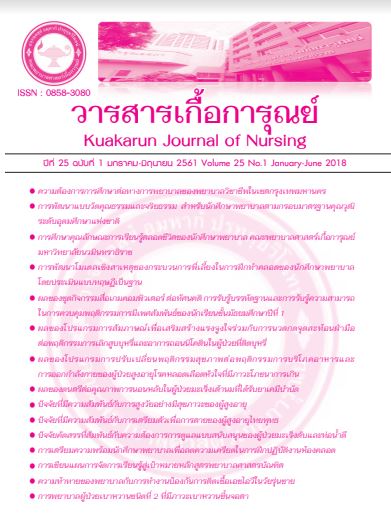ผลของชุดกิจกรรมสื่อเกมคอมพิวเตอร์ต่อทัศนคติ การรับรู้บรรทัดฐาน และการรับรู้ความสามารถในการควบคุมพฤติกรรมการมีเพศสัมพันธ์ ของนักเรียนชั้นมัธยมศึกษาปีที่ 1
คำสำคัญ:
สื่อเกมคอมพิวเตอร์, ทัศนคติ, การรับรู้บรรทัดฐาน, การรับรู้ความสามารถในการ ควบคุมพฤติกรรม, พฤติกรรมการมีเพศสัมพันธ์, วัยรุ่นบทคัดย่อ
การวิจัยครั้งนี้เป็นการวิจัยกึ่งทดลอง เพื่อศึกษาผลของการจัดอบรมโดยใช้ชุดกิจกรรม สื่อเกมคอมพิวเตอร์ ต่อทัศนคติ การรับรู้บรรทัดฐาน และการรับรู้ความสามารถในการควบคุม พฤติกรรมการมีเพศสัมพันธ์ของนักเรียนชั้นมัธยมศึกษาปีที่ 1 โรงเรียนมัธยมศึกษาแห่งหนึ่งในกรุงเทพมหานคร โดยใช้วิธีการสุ่มห้องเรียนเข้าเป็นกลุ่มทดลองและกลุ่มควบคุม กลุ่มทดลองเป็นกลุ่มที่ได้รับชุดกิจกรรมสื่อเกมคอมพิวเตอร์ร่วมกับการสอนตามปกติ จำนวน 42 คน และกลุ่มควบคุมเป็นกลุ่มที่ได้รับการสอนตามปกติ จำนวน 43 คน เครื่องมือที่ใช้ในการทดลองประกอบด้วย แผนการดำเนินกิจกรรม สื่อเกมคอมพิวเตอร์ และอุปกรณ์อื่น ๆ ในการทำกิจกรรม ส่วนเครื่องมือที่ใช้ในการเก็บรวบรวมข้อมูล ประกอบด้วย แบบสอบถามข้อมูลทั่วไป แบบสอบถามทัศนคติเกี่ยวกับพฤติกรรมการมีเพศสัมพันธ์ แบบสอบถามการรับรู้บรรทัดฐานเกี่ยวกับพฤติกรรมการมีเพศสัมพันธ์ และแบบสอบถามการรับรู้ความสามารถในการควบคุมพฤติกรรมการมีเพศสัมพันธ์ ผ่านการหาคุณภาพเครื่องมือด้วยการตรวจสอบความตรงตามเนื้อหาโดยผู้ทรงคุณวุฒิ 5 ท่าน และหาค่าความเที่ยงด้วยค่าสัมประสิทธิ์แอลฟ่าของครอนบาค(Cronbach’s Alpha Coefficient) มีค่าเท่ากับ .88, .91 และ .89 ตามลำดับ การรวบรวม
ข้อมูลดำเนินการเดือนมกราคม-กุมภาพันธ์ 2559 วิเคราะห์ข้อมูลโดยใช้ สถิติบรรยาย และ สถิติทีผลการวิจัยพบว่า ทัศนคติต่อพฤติกรรมการมีเพศสัมพันธ์ และการรับรู้ความสามารถในการควบคุมพฤติกรรมการมีเพศสัมพันธ์ของกลุ่มทดลองสูงกว่ากลุ่มควบคุมอย่างมีนัยสำคัญ ทางสถิติที่ระดับ .05 ส่วนการรับรู้บรรทัดฐานต่อพฤติกรรมการมีเพศสัมพันธ์ไม่แตกต่างกัน

















